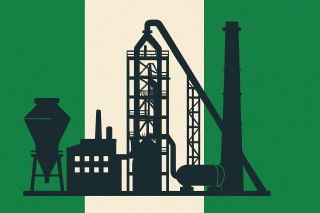This week Tunisian-based United Cement Investor announced that it will build a new 1.5Mta integrated cement plant in Tataouine, Tunisia, with work starting in March this year. This will be the most southerly cement plant in the north African country, situated 120km from the coastal city of Gabes and about 300km from the Libyan capital of Tripoli. However, starting new plants in Tunisia is a hazardous affair.
Carthage Cement
In October 2018 Carthage Cement recorded a 29 per cent YoY increase in 9M turnover. Indications are that Tunisia's cement market is starting to pick up. But Al-Karama Holding has been trying to complete the sale for a 50.52 per cent stake in the 2.2Mta plant for the last year. Interested parties in the plant are said to include: a consortium formed by Secil-Companhia Geral de Cal e Cimento and Société des Ciments de Gabès (Portugal), Eurocem Ltd (Malta), Cementos Portland Valderrivas (Spain), Omnium des Industries et de la Promotion (whose owner also operates CIMAF of Morocco) and Cemolins Internacional SLU (Spain). The sale process has been further delayed this winter, when it was discovered that the land the plant has been built on was for agricultural use and had not been decommissioned. Moreover, Tunisia’s law prohibits foreigners from acquiring agricultural land.
The Carthage plant was created in 2008 and is situated in Jebel Ressas, where it operates two quarries. Recent activity has seen the company transfer its clinker exports from the port of La Goulette to the port of Rades, where work on a new wharf is expected to take two years. The company currently exports nearly 4Mt of clinker to African countries including Côte d’Ivoire, where it can achieve prices of US$36/t of clinker. Carthage Cement’s first export of clinker to sub-Saharan Africa was completed in February 2018.
Greenfield activity
If investment in existing cement capacity has been slow to take off in Tunisia, the country has been similarly slow to see the erection of greenfield capacity. Ciment de la Méditerranée Gafsa SA (CMG) was created in 2009 and planned a 1.2Mta plant in El Guettar, which was originally scheduled to open in June 2018. However, Ali Hlioui, former CEO of Banque du Sud, failed to find sufficient financing for the US$300m project and was arrested in 2017 on money laundering charges. The project is a joint venture that had partners from Tunisia, Libya, Portugal and Spain. Al Majd Holding now aims to complete the project via Sicar Zarat, its venture capital investment company, which has a stake in CMG after the Spanish partners pulled out.
King PowerKing International-Middle East Africa is another 1.2Mta greenfield cement plant, located 5km south of Mazzouna village, Sidi Bouzid governate. When the Sidi Bouzid cement plant was announced in 2013, investment costs were around US$240m. The project aimed to sell 30 per cent of its production in the domestic market and export the remaining 70 per cent to Libya and Algeria. Some 33 per cent of total expenses will be the cost of road and rail transport to Tunisia's ports and through the port of Tripoli.
The design of the Sidi Bouzid cement works includes a 3300tpd kiln line and eight 40,000t storage silos as well as an onsite analysis lab. Completion was scheduled for 2018, but as yet there is no news on the plant reaching the commissioning stage.
Tunisia – strategic exporter
Companies preparing to secure a foothold in Tunisia as a cement production base are likely to be mainly looking at the potential for exports to nearby Libya, west Africa or indeed across the Mediterranean into Europe. The EU Emissions Trading Scheme will progressively add costs to EU producers with rising carbon prices beginning to bite. Unless the EU imposes a border tariff on cement and clinker imports into the region, Tunisia could become a strategic clinker source for European cement producers and importers.
The potential has not escaped the attention of leading Chinese producer, Anhui Conch, which had talks with Minister of Industry and Small and Medium Enterprises, Slim Feriani, in March 2018, and announced its intention to open an office in Tunis.
Meanwhile, the sale of Carthage Cement – the largest plant in the country – could establish a clear market leader in Tunisia if any of the incumbents, including Secil, Grupo Cementos Portland Valderrivas and Cementos Molins, manage to acquire the producer.

Huaxin’s acquisition takes the competition to Dangote’s door
Last week Huaxin announced that it had completed the acquisition of Holcim’s 83.81 per cent sta...